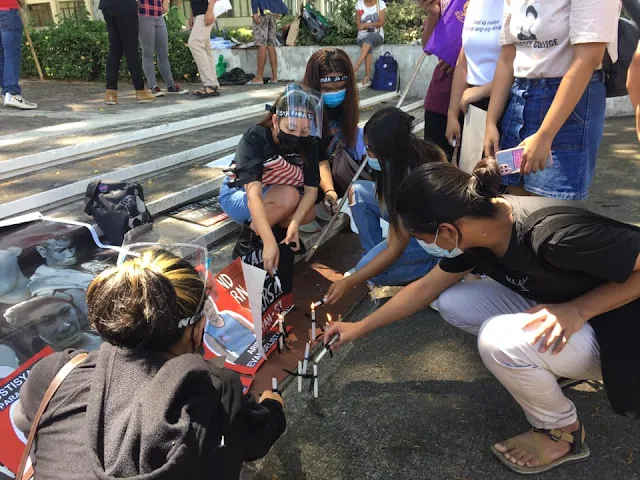by Nimfa Estrellado March 19, 2021 Candle lighting ceremony for Bloody Sunday Mass...
March 19, 2021

|
| Candle lighting ceremony for Bloody Sunday Massacre Victims at UPLB Carabao Park. (Photo from Defend Southern Tagalog FB Page) |
The murder of couple Chai Lemita-Evangelista and Ariel Evangelista, and other leaders-activists on Bloody Sunday can be compared to the 'Tokhang-style' where the victims are badly killed and the fighters appear to be fighting, then fabricated evidence is planted, such as weapons and explosives, according to Anakbayan-Batangas.
Among the five killed individuals during the Bloody Sunday Massacre were Chai Lemita-Evangelista and Ariel Evangelista, fishing leaders in Nasugbu, Batangas who actively condemned development aggressions in the province.
According to the report the Evangelista family, along with their ten-year-old son, were raided and shot by police butchers at their home on March 7.
After their son escaped, the police quickly picked up the couple's body. Their bodies were found by relatives at a funeral home.
The opposition's Senator Leila M. de Lima on March 16, 2021, has asked Congress to investigate the the legality of the recent joint and simultaneous operations by the Philippine National Police (PNP) and the Armed Forces of the Philippines (AFP) in the CALABARZON region, which resulted in the deaths of activists.
De Lima, a vocal supporter of social justice and human rights, introduced Senate Resolution (SR) No. 681, calling for an investigation into the Duterte administration's counter-insurgency campaign in light of widespread reports of human rights violations.
"A careful review and scrutiny of the events that transpired that came at the price of human lives must thus be undertaken in order to determine the transgressions committed and prosecuted to the fullest extent of the law," she said.
"It is imperative to conduct a thorough, independent and impartial inquiry to determine, once and for all, if the government's whole-of-nation approach to counter-insurgency has truly been an effective means of addressing the decades-long communist insurgency," she added.
President Duterte gave a speech on March 5 in which he ordered police and the military to disregard human rights and to execute communist rebels in all armed encounters.
Two days later, on March 7, nine people were killed and six others were arrested in simultaneous PNP and AFP raids in Laguna, Rizal, Cavite, and Batangas, the most recent in a long line of activist killings perpetrated by the country's police and military.
Despite the PNP's insistence that its operations were legitimate, progressive groups condemned them as nothing more than executions and "Tokhang-style" executions.
"Simply buying into the narratives robs those who were killed of due process, their right to equality before courts and to a fair trial, which is guaranteed in international human rights law and denies the State's security forces the opportunity to reflect on and learn from the incident," De Lima maintained.
Duterte had also released a shoot-to-kill order against armed CPP-NPA rebels, according to National Security Adviser (NSA) Hermogenes Esperon Jr. on March 9.
"Sa nakalipas na mahigit apat na taon, walang tigil ang brutal na mga pagpatay--mula sa mahihirap at pinaghihinalaang drug suspect, abogado, LGU officials, mga kawani ng media, mga aktibista, hanggang sa mga tagapagtanggol ng karapatang pantao--na nag-uugat at pinalulubha pa lalo ng pag-udyok ng karahasan ng kasalukuyang rehimen. Ang patuloy na pananahimik at kawalang aksyon para panagutin ang mga salarin dito ay lantarang pagpapabaya sa tungkulin at malaking pagkakasala sa tiwala ng taumbayan," De Lima added.
In submitting the Resolution, De Lima emphasized the importance of distinguishing between armed combatants and civilians in order to ensure that the rules of engagement are always followed.
"The State should not condone the illegal activities of the NPA and should exert all efforts to neutralize any threats to destabilize the government in order to maintain peace and order," she said.
"However, the State should also be able to readily distinguish between armed combatants and civilians and ensure that human rights be strictly observed and respected at all times in the engagement of its suspects," she added.
According to Human Rights Watch, the fundamental problem with the State's counter-insurgency campaign is its deliberate inability to differentiate between armed rebels and rights defenders, labor leaders, and activists.
Former Vice President Jejomar Binay voiced his concern about the killings in a statement released Monday, calling them "wanton disregard for the rule of law and due process."
"Ngayon, aktibista ang hinuhuli at pinapatay. Maaaring bukas, ikaw na ang target. Hihintayin pa ba natin mangyari yon?" he said.
He also said the legitimate dissent was "narrowing with each passing day" and " being equated to armed insurgency."
"It is imperative that our rights and freedoms remain protected, otherwise we might see the day when any criticism of the government would be considered as a criminal act," Binay reiterates.
Gabriela Women’s Party Representative Arlene Brosas also said the Tokhang-style crackdown
The Tokhang-style crackdown, according to Gabriela Women's Party Representative Arlene Brosas, “was meant to instill fear among the growing people’s movement against Duterte's bloody regime."
One component of the war on drugs by the administration of President Rodrigo Duterte is Oplan Tokhang. The name of the operation was derived from the Cebuano words tuktok or to knock and hangyo to plead. As the name suggests, Oplan Tokhang involves the police visiting the houses of individuals suspected to be involved in the illegal drug trade or as users, to persuade them to stop their activities and submit themselves to authority for potential rehabilitation. - With a report from Senate





.jpeg)


No comments